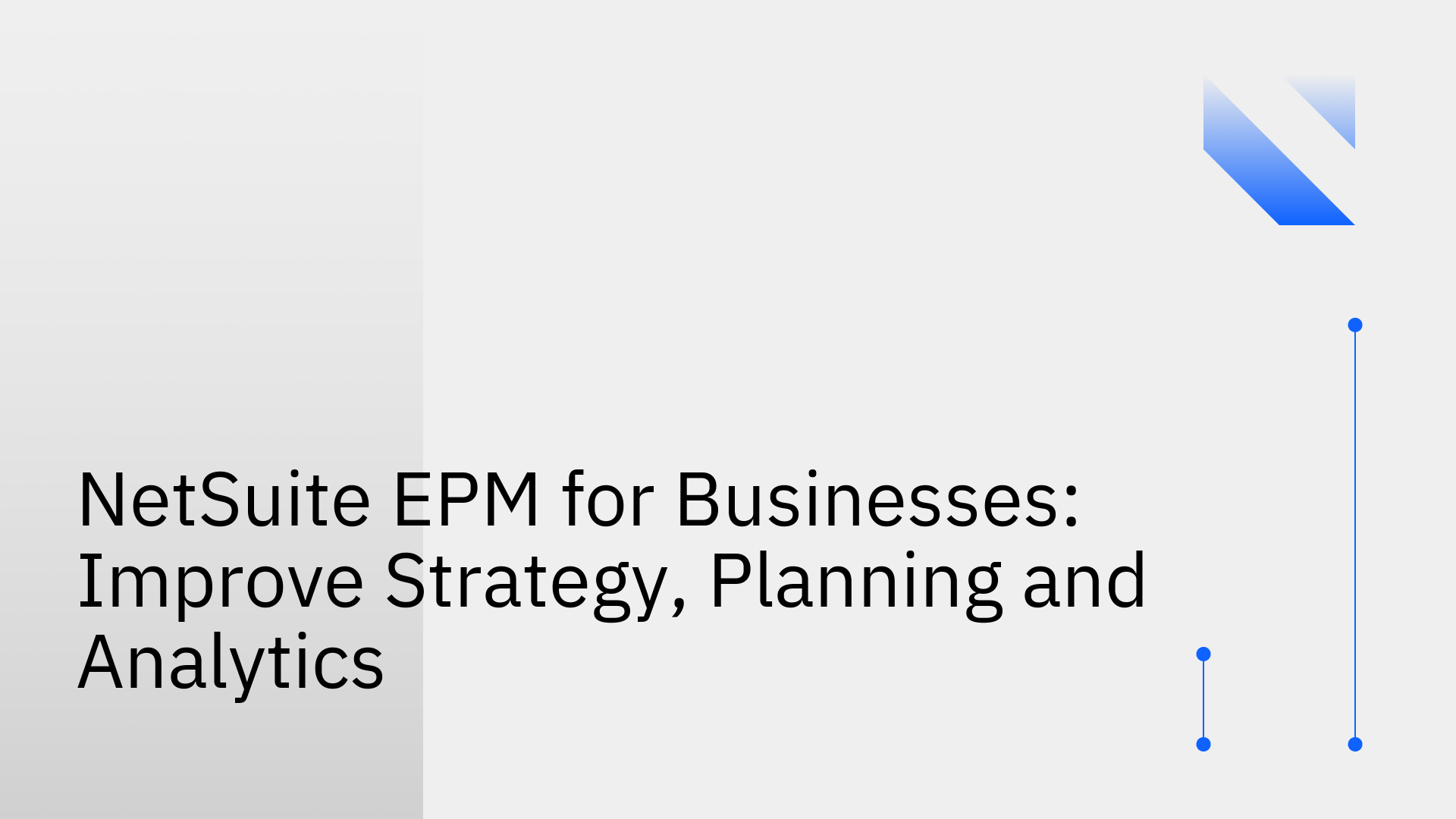
NetSuite Enterprise Performance Management (EPM) helps businesses unify financial planning, budgeting, reporting, and reconciliation in a single solution. By automating manual tasks and integrating data across systems, it empowers teams to accelerate financial processes, improve collaboration, and make better-informed decisions in real time.
NetSuite EPM is a comprehensive business performance management platform that brings together planning, budgeting, forecasting, financial close, and reporting. Built on Oracle Fusion Cloud Enterprise Performance Management, it integrates seamlessly into NetSuite ERP, ensuring accuracy and consistency across financial and operational data.
Instead of juggling multiple tools and spreadsheets, organizations gain a connected environment where every financial process, from planning to close, is streamlined and accessible in real time.
Finance teams can automate labor-intensive processes, run what-if scenario modeling, and generate forecasts with ease. Embedded AI and machine learning deliver deeper insights and improve forecasting accuracy, allowing businesses to plan proactively.
NetSuite EPM eliminates repetitive manual reconciliation. Automated workflows ensure data accuracy, reduce close times, and minimize errors — helping businesses achieve a faster, smoother period-end financial close process.
The platform unifies reporting with built-in dashboards, ad-hoc analysis, and narrative reporting tools. Teams can create accurate, real-time reports that support both compliance and strategic decision-making insights.
By analyzing profitability at multiple levels, businesses can understand cost drivers, optimize resource allocation, and improve overall efficiency. This feature supports smarter, data-driven decisions across departments.
Bringing financial and operational data into a single platform improves accessibility, eliminates silos, and ensures data consistency across the organization.
With real-time dashboards and forecasting capabilities, leaders can align planning with execution, driving strategy based on current, accurate data.
NetSuite EPM accelerates the financial close process by automating reconciliation and consolidation tasks, reducing risk and freeing up teams for higher-value analysis.
Instead of separate, disconnected tools, businesses gain a comprehensive solution that supports collaboration across finance, operations, and strategy teams. This operational efficiency is the foundation of stronger business outcomes.
Spreadsheets and manual processes often lead to delays and inaccuracies. NetSuite EPM centralizes these tasks, making them more collaborative and precise.
Automated reconciliation ensures accuracy and reduces time spent tracking and validating balances.
With role-based workflows and standardized close checklists, the platform simplifies what is typically a complex and error-prone process.
Real-time dashboards, data visualizations, and narrative reports provide clarity and accessibility that traditional systems cannot match.
NetSuite EPM comes with SuiteSuccess, a customer lifecycle methodology backed by 25+ years of experience. This framework provides industry-specific best practices, implementation guidance, and continuous optimization to ensure faster ROI, better employee adoption, and long-term scalability.
NetSuite EPM is available as an add-on module to the NetSuite ERP platform. Pricing depends on three core factors:
There’s also a one-time implementation fee. Because it’s cloud-based, businesses can scale by adding users or activating new modules as needed.
For companies seeking to improve efficiency, reduce manual financial workloads, and connect planning with execution, NetSuite EPM delivers measurable value. By consolidating key financial processes into a single platform, it ensures operational efficiency while enabling leaders to make data-driven decisions with confidence.
Organizations pursuing NetSuite certification or implementing NetSuite project management will also find that EPM strengthens their ERP strategy, ensuring both compliance and scalability.
Financial processes drive every decision across a business. By adopting NetSuite EPM, companies can achieve faster closes, stronger collaboration, and greater accurac, all while freeing up teams to focus on strategy instead of manual tasks.
If your business is ready to modernize performance management, Stacksync can help you connect NetSuite with your broader ecosystem of CRMs, databases, and SaaS tools. With real-time, bi-directional synchronization, Stacksync ensures your financial and operational data stays consistent across all platforms, unlocking true operational efficiency.
👉 Book a demo with Stacksync today and discover how to extend the power of NetSuite EPM across your business systems.